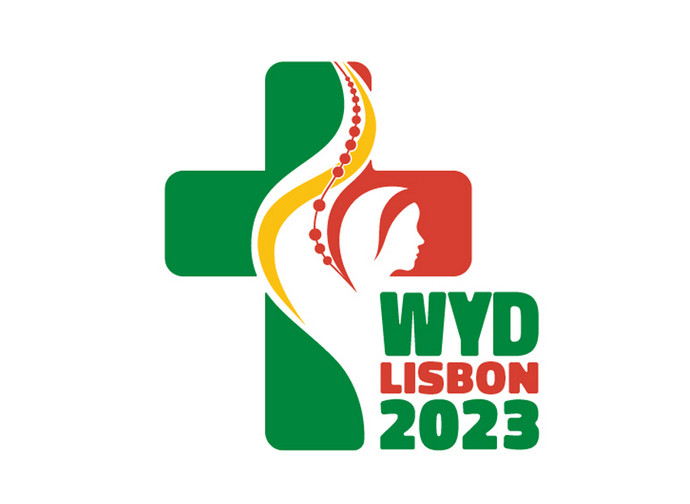WYD: the golden calf of environmentalism
At World Youth Day in Lisbon (1-6 August), themes such as pollution and the climate occupy a central place. But environmentalism overturns the order of creation, degrades mankind and replaces the worship of God with the worship of the Earth.

Yesterday World Youth Day (WYD) began in Lisbon. Today, 2 August, among the various initiatives, there is the first Rise Up, that is, as presented by the organisers, a new form of catechesis, so new that it looks nothing like catechesis. Today, in fact, they will talk about Integral Ecology: care for the other and for the whole of creation (the other two Encounters of ‘Rise Up’ - a name reminiscent of a sugary fizzy drink - will be about Social Friendship and Mercy).
The official WYD website presents today's catechesis through a video in which a young man instructs us as follows: "Let us reflect on the planet's resources and what we leave to future generations. Taking care of the common home implies reflecting on the human and social dimensions. Integral ecology is inseparable from the notion of the common good. [...] In Laudato si', Pope Francis presents us with St Francis of Assisi as the main example in that he lives in wonderful harmony with God, others, nature, and himself. We must make this ambition our own! [...] An integral ecology requires time to rediscover a serene harmony with Creation, to reflect on our lifestyle and ideals, to contemplate the Creator. Everything is connected. Human existence rests on three fundamental pillars: relationship with God, with others, and with the Earth. [...] Take care of our common home! Now!"
In the previous months, young people from all the dioceses of the world had been invited to prepare to discuss this theme by means of a number of meetings. In the explanatory handbook for organising these meetings, it was explained that, in relation to the ecological theme, "this preparatory meeting aims to provide young people with a time to listen to each other on the various dimensions of integral ecology". These dimensions were then indicated: “pollution and climate change; the question of water; loss of biodiversity; deterioration of the quality of human life and social degradation; planetary iniquity”.
Faithful to the command of Monsignor Américo Aguiar, in charge of the Lisbon WYD, who ordered that there should be no mention of evangelisation during the WYD, here the young people will talk, listen, and discuss global warming, melting glaciers, and air conditioners. To the desertification of faith they have substituted the climatic-environmental desertification; to the pollution of souls the pollution of rivers, lakes, and seas; to moral integrity the integral ecology; to eternal salvation the short one linked to the fight against global warming; to conversion to God the environmental conversion; to sacraments, recycling and electric cars; to diversity of charisms, biodiversity; to examination of conscience, self-accusation of anthropogenic global warming; to processions, environmentalist marches; to Fridays of abstinence, Fridays for the Future; to timor Dei, eco-anxiety; to Our Lady, Greta Thunberg. To the worship of God the worship of the goddess Earth.
The Environmentalist Youth, dressed in green, are therefore ready to be converted, or rather perverted. For environmentalism has as much to do with Catholicism as Al-Qāʿida has to do with world peace. Instead, the correct relationship between believer and creation hinges on the following aspects. First: every natural entity is in itself good because it finds its first cause in God. In it, therefore, some perfection of the Creator shines forth, even though nature too has suffered the negative reverberations of original sin ("cursed be the ground because of you!”: in Genesis 3:17 is the ultimate explanation for floods, tsunamis, fires, earthquakes, typhoons, and more). Second: the goodness of creation that is revealed to us in its beauty and intimate rationality provokes or must provoke a hymn of praise to God. This is what St Francis did. Third: creation can and must be used by mankind for mankind's sake, i.e. for his sanctification, and must not be abused not because the ladybird or the glacier have rights (they cannot have rights because they are not persons), but because the intrinsic value of created goods - which are harmonically unequal - and respect for personal dignity imply conduct in keeping with these two aspects. This is to say that if I torture a cat, I am not behaving in a manner appropriate to the value of the quadruped and above all to my personal dignity.
Environmentalism, even in its Catholic sauce, on the other hand, assigns personal dignity to animals, plants, and things; and so an objectively marginal issue necessarily becomes central, also to fill an obvious content vacuum in the Church's pastoral care since the Catholic doctrinal proprium has been all but obliterated. By thus assigning to non-human creatures a value they do not have, environmentalism overturns the hierarchical order that sees mankind as superior in dignity to other corporeal creatures, pushing him down and accusing him of exploiting the planet. A blatantly satanic dynamic, since the devil can only create disorder, i.e. mirror-reverse the intrinsic value of goods. The golden calf is now grazing in Lisbon.
